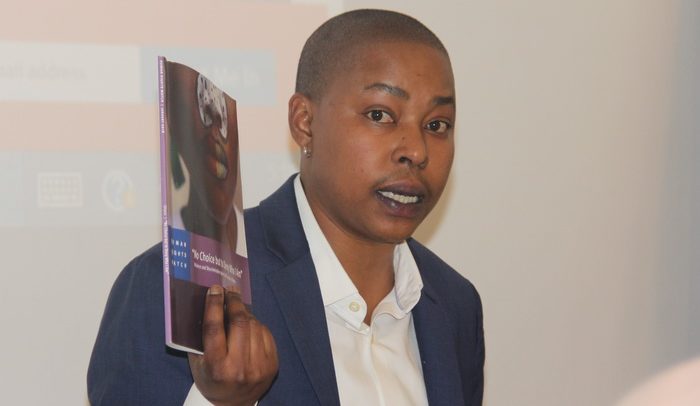Ms Wendy Isaack, President, Human Rights Watch launching the Ghana report.
Human Rights Watch (HRW), an international organisation that works as part of a vibrant movement to uphold human dignity and advance the cause of human rights for all, has asked the government to repeal a law which criminalises same-sex activities.
A report released by the organisation has established that Ghanaians who are lesbians, gay, bisexual, or transgender (LGBT) suffer widespread discrimination and abuse both in public and in family settings.
Repeal archaic law
According to the 72-page report, while some Ghanaian officials have publicly called for an end to violence based on sexual orientation and gender identity, the government is yet to repeal the old law that criminalises people of LGBT orientation.
Launching the report in Accra on Monday, the President of the HRW, Ms Wendy Isaack, called on the President to publicly condemn all threats and acts of violence against LGBT people and appealed to Parliament to repeal Sections 104 (1b) of the Criminal Offences Act that criminalise adult consensual same sex conduct.
She further called for the amendment of Chapter 5 of the 1992 Constitution on Fundamental Rights and Freedoms to include a specific prohibition of discrimination based on sexual orientation and gender identity.
The report
The report, titled “No Choice but to Deny Who I Am: Violence and Discrimination against LGBT People in Ghana,” demonstrated how the retention of section 104 (1)(b) of the Criminal Offences Act, 1960 that prohibits and punishes “unnatural carnal knowledge” and failure to actively address violence and discrimination relegated Ghanaians with LGBT to second-class citizenship.
“Police officials and the Commission on Human Rights and Administrative Justice (CHRAJ) have taken some steps to protect LGBT people but they are still victims of physical violence and psychological abuse, extortion and discrimination in many aspects of their daily life,” Ms Isaack said.
“Having a law on the books that criminalises adult consensual same-sex conduct contributes to a climate in which LGBT people are frequently victims of violence and discrimination,” she added.
She noted with concern that homophobic statements by local and national government officials, traditional elders and senior religious leaders foment discrimination and in some cases incite violence.
Research
The report interviewed 114 LGBT people in Accra, Tamale, Kumasi, and Cape Coast in December 2016 and February 2017 and three representatives of human rights organisations based in Ghana, made up of a Commission on Human Rights and Administrative Justice (CHRAJ) complaints officer, an assistant police commissioner and three diplomats in Accra.
“Many of those interviewed said that the law contributed to a climate in which violence and discrimination against LGBT people was common. The provision is rarely, if ever, used to prosecute people and unlike several of its neighbours, Ghana has not taken steps in recent years to stiffen penalties against consensual same-sex conduct or to expressly criminalise sexual relations between women,” the report said.
It commended the Ghana Police Service for regularly responding to abuses against LGBT people and cited cases of false accusation and blackmail of gay men in Tamale and CHRAJ for establishing an online system to register allegations of discrimination on the basis of sexual orientation and gender identity, which has processed 36 cases.
Condemnable comments
The HRW did not take kindly to comments made by the Speaker of Parliament, Prof. Mike Oquaye, in February last year, when he referred to homosexuality as an “abomination” and called for stricter laws against same-sex conduct.
The organisation claimed that a particular comment made by the Speaker of Parliament (not stated) heightened tensions for LGBT people and contributed to an increase in calls by some opinion leaders, including other Members of Parliament, to further criminalise same-sex activity.
It described President Nana Addo Dankwa Akufo-Addo’s comments on LGBT in a recent interview with Al Jazeera as rather conciliatory when he said he did not believe “a sufficiently strong coalition has emerged which is having that impact on public opinion that will say change it – let’s then have new paradigm in Ghana” on why the law still remained in the country’s statute books.
The Director of Amnesty International Ghana, Mr Robert Akoto Amoafo, said LGBT people were human beings, and therefore, like all other groups of people, their rights must be respected at all times.
-DailyGraphic


